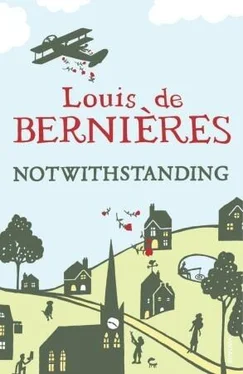Outside the rain resumes, and Alan is comforted by its tattoo upon the tarred felt of the roof. He hears John returning, and quickly confides to George, ‘No, I’m not. I’m not going to mess it up, I’m really not.’ A thought occurs to him. ‘I don’t suppose that John and Sylvie would let me.’
The door scrapes as John comes in. He removes his crumpled hat and shakes the drops of water to the floor. ‘Still here?’ he asks rhetorically.
Alan is moved to say something, he is not even sure what it is until it emerges from his mouth. ‘John, before Sylvie gets back, I just want to say … even though it’s a while before I go … I want to say it’s been a pleasure … the gardens … working here with you … all that. I’ll be sorry to go to university. Thanks for everything.’
John looks at him for a long moment, and sighs. ‘I’ve worked here all my life,’ he says at last, ‘this is all it’s ever been.’ John feels resentful, he wants to say that for Alan this has been merely a picturesque adventure among the peasants, but he does not know exactly how to say it, and in any case he knows that it is only half the truth. The truth is that they have come to be fond of each other, and have learned mutual respect. John says, ‘I suppose you’ll be needing a job in the holidays. Come back any time.’
Alan smiles and offers John his hand, as if sealing a deal. ‘Just try and keep me away,’ he says, and John feels a moment of vindication that moves him, but which he cannot entirely explain. ‘Let’s bring in the tomato plants,’ he says, ‘I’ve got a trick to show you that Harold showed me afore his marbles rolled away. What you do is, you bring ’em in, the whole plants, and strip the leaves, and you tie ’em together and hang ’em with the roots upwards, right? And then the ones that are green just carry on ripening, and now and then you chuck out the ones that’ve gone off. And that way you get your red tomatoes ’til November, and you don’t have your missus making bloody green-tomato chutney and putting it in your sarnies every morning.’
The two men walk away together, finding their intimacy, as Britons do, not in words, but in the common labour of their hands.
THE AUSPICIOUS MEETING OF THE FIRST MEMBER OF THE FAMOUS NOTWITHSTANDING WIND QUARTET WITH THE FOURTH

NOW THAT THE children were all at the tiny school on the side of the hill near the turning to the church, Jenny Farhoumand began to search for a part-time job. She was in Palmer’s music shop in Godalming, looking through the tray of oboe reeds for the stiffer ones, when, quite out of the blue, she was inspired to ask one of the two old ladies who ran it whether or not they needed any help in the mornings.
As it happened they did, and Jenny immediately began to look forward to happy hours browsing through all the sheet music, and teaching herself how to play some of the instruments that were hanging off the walls.
It didn’t work out quite like that, however. She had not reckoned with Record Corner being just nearby, up near Mr Garland the dentist, and she spent all her wages every Wednesday in the classical section. In addition, the shop was really very busy, mostly with young people trying out the guitars. Barnes & Mullins were supplying some surprisingly good cheap ones from Spain, and her heart was constantly in her mouth as the youngsters took them down, knocked them against chairs and then strummed rather too aggressively.
They had a standardised repertoire, it seemed, and she quickly learned to recognise the tunes. They all knew the first few bars of something called ‘Stairway to Heaven’, they all knew a song called ‘The Streets of London’, another one called ‘The Last Thing on my Mind’, and another one called ‘Suzanne’. Those who were reasonable players all knew a tune called ‘Anji’, which could be played in lots of different ways while always sounding the same, and there was another called ‘Anonymous Spanish Romance’. Everybody could play the first part in E minor, but then they ground to a halt as soon as it went into E major. She grew to expect it, and would inwardly wince as the E major part drew nearer. Still, people ordered copies by the hundred. The youngsters were inclined to buy little things, which were really not much use, such as castanets, because that was all they could afford. They bought the cheapest guitar strings, and then had to come back for more when they broke shortly afterwards.
One morning Jenny was in the shop, shaking her head and smiling. She had just seen the General go by, without his trousers on, accompanied by a policeman. The General was talking animatedly about going to buy a cricket ball, and the policeman was humouring him as he guided him by the arm. He was such a sweet old man, but he was losing his marbles. She reminded herself to take him a pot of marmalade.
Shortly afterwards a woman in her thirties came in with a clarinet for sale. It was a nice one, a Buffet RC, and it was in good condition. Jenny laid it out on the desk and checked that everything was working. She squinted at the pads, looked at the mouthpiece with its little tooth marks, and then put it back into its case.
‘I can’t really offer you a price,’ she said, ‘because I don’t own the shop. Can you leave it with us? Give me your phone number, and we can arrange for you to come in.’
The woman seemed flustered. ‘Oh, I was really hoping to sell it today. I do need the money, you see. It’s quite urgent.’
Jenny nodded sympathetically. ‘I’m not the buyer. I wouldn’t be allowed. I’ll ring you as soon as I know, I promise.’
As soon as the woman had gone, Jenny picked up the telephone and dialled directory enquiries. Stamped on the clarinet she had found the words ‘Property of the Inner London Education Authority’.
Three hours later, and by now seething with rage, Jenny had still not managed to locate anybody in the Inner London Education Authority who knew anything at all about how they acquired or disposed of musical instruments. She had been passed from one person to another, rung dozens of different numbers, and been told, ‘Oh, that’s not our department. Why don’t you try so-and-so? Hang on, I’ll see if I can find the number.’ Then she’d hear her interlocutor calling out to the other members of the office, ‘Anyone know so-and-so’s number? Anyone know who does musical instruments?’
Jenny gave up, and listened to a young fellow with huge sideburns and curly long hair fumbling his way through ‘Für Elise’ on one of the Spanish guitars. He was the one who always broke his D string and had to come in for another one. Last time she’d persuaded him to buy two. More often than not he appeared with a large, patient golden retriever that lay down and sighed until his young master had tried out all the guitars that he couldn’t afford. When he had finished the little bit of Beethoven, she said, ‘You don’t know what a relief that is. If I hear “Stairway to Heaven” one more time, I’ll scream.’
The young man smiled. ‘Lucky you warned me. I was going to play that next.’
Just then the policeman, having disposed of the General, strolled past the window of the shop, and Jenny ran out and buttonholed him. He came in and looked at the clarinet, with its stamp.
‘It’s a good one, is it?’ he asked. ‘Expensive?’
‘Yes,’ said Jenny, ‘these are worth a lot. They’re very sought after.’
‘Well, madam, you should ring this customer up, and tell her that you can’t buy it without a receipt, and she’ll have to come in and fetch it away if she hasn’t got one. You let me know when she’s coming, and I’ll be here to ask a few questions, or one of my colleagues will.’
Читать дальше













